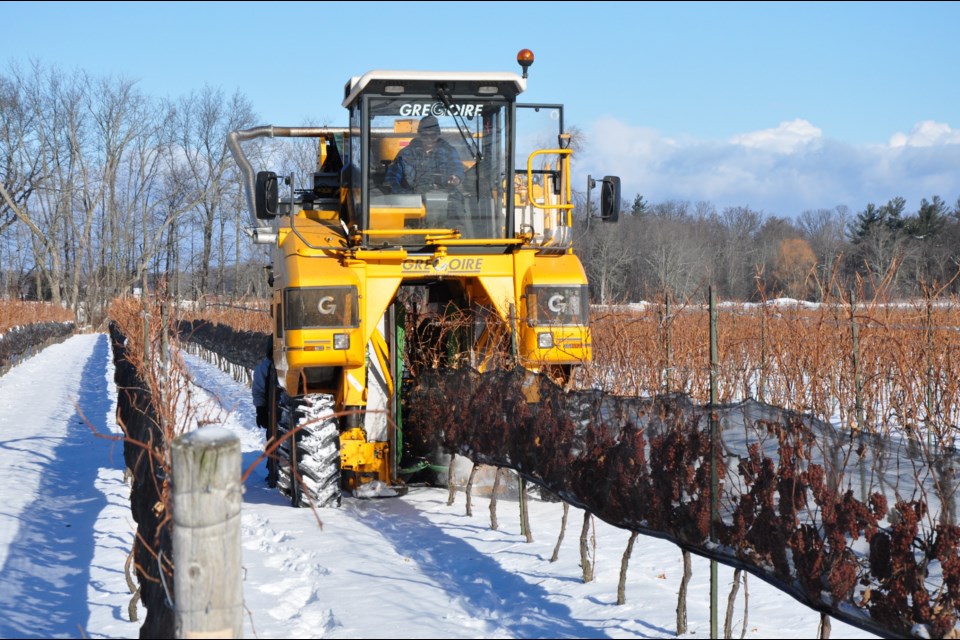Cheers to a great icewine grape harvest this winter.
On a crisp -24 C morning just before the New Year, I had an opportunity to witness the launch of the 2017 harvest at Henry of Pelham Family Estate winery in the Niagara Region.
A four-day forecast of consistently low temperatures meant that the frozen grapes – left on the vine through the fall to dehydrate, to concentrate their sugar -- were ready to come off.
Sometimes the harvest takes place at night, to avoid the warming or melting effect of the sun on the grapes.
But that hasn’t been a worry this year, given the rock-bottom temperatures.
As far as I could tell, the frozen brownish grapes were totally unaffected by the gorgeous daylight on the clear morning I visited the vineyard. I watched as the grape harvester shimmied its way down the many rows of vines, noisily shaking the super-sweet grapes off the vine and into a temporary holding bin onboard (some wineries harvest icewine grapes by hand; Henry of Pelham hasn’t done so for 15 years).
At the end of the row, the bin gets emptied into transportable containers set on a wagon and pulled by tractor to the winery. From there, they are loaded into a press and squeezed. The ultra sweet juice from this pressing is fermented, and ultimately becomes icewine.
So, at least one good thing comes out such an incessant deep and long cold snap.
Prof. Mark Holmes of the University of Guelph’s College of Business and Economics has studied the Niagara region’s success in what’s called integrated rural wine tourism.
It’s a field that looks at how wine tourism attracts people to the region, and what that draw means for the region’s sustainability.
A huge benefit of wine tourism is that it generates income. In Niagara’s case, wine tourism contributes about $90 million in retail wine store sales.
Second, it certainly means profile. Even on the freezing cold day I visited Henry of Pelham, a wine tour bus arrived just before noon. Wine aficionados poured out of the vehicle and headed straight to the retail outlet for a tasting.
As far as I could tell, few other attractions were helping buoy the local economy that frozen-solid day.
And that was activity at just one winery. Today, about 180 wineries are established in the Niagara region (compared to six, in 1974). Nearly nine per cent of all the agricultural land in the Niagara Peninsula is planted to grapes.
Those are certainly impressive numbers. But how can the industry be sustained?
In the long run, wine production depends on good farming practices and sustainable agriculture. Holmes says sustainability is being promoted by grape growers and other fruit and vegetable producers in the Niagara region through integrated and targeted pest management, and responsible approaches to crop protection.
Some vineyards are practically right on top of residential developments. Others are a stone’s throw away. Producers are under the microscope. With the growing percentage of land going into grape production, they must take extra measures to live in harmony with their neighbours.
That may include taking care to keep their vineyards aesthetically pleasing and create attractive wine vistas. Even in the dead of winter, driving through or past well-kept vineyards is a feel-good experience. Though the vines are dormant, the vineyards looks neat, tidy and symmetrical.
Holmes says synergies develop from wine tourism – like the wine tour company bus that pulled into Henry of Pelham, as well as marketers, accommodations and restaurants, supporting one another.
“There’s a multiplier effect,” he says. “They all work together to improve the wine experience.”
And the system keeps on working, regardless of the season.
A summer wine tour through Niagara is indeed wonderful. But there’s something to be said for visiting wineries when the pressure’s off and there’s a bit more elbow room. That time is now.
